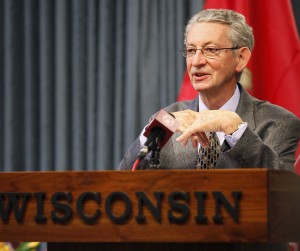David Ward may only be an interim chancellor, but he doesn't want the next two years to be wasted time for UW-Madison.
He's set out an ambitious agenda to implement newly gained authority from state government and reform the university's finances.
 "It's not a happy message," Ward said in an interview in his Bascom Hall office Wednesday, the day after his interim term was extended a year through summer 2013. "Even though people may applaud, a lot of them are very troubled by it. I don't see this as a quick fix."
"It's not a happy message," Ward said in an interview in his Bascom Hall office Wednesday, the day after his interim term was extended a year through summer 2013. "Even though people may applaud, a lot of them are very troubled by it. I don't see this as a quick fix."
Ward, 73, is a familiar face on Bascom Hill. He was chancellor from 1993 to 2001. Since Biddy Martin left in July and Ward took over, he's proved to be popular. It was in large part because of requests from students, faculty and staff members that his tenure was extended.
Here are edited excerpts of the interview:
Q: How did you make your decision to continue on for a second year?
A: I thought it would be a huge challenge to reassimilate. But to be very frank, it's like wearing old clothes. While the issues are different, functionally and culturally, the place seems to work like I remember it. ... Second thing, in terms of the extension, I tried to create a dialogue about change. Almost every public flagship institution is probably facing a revenue crisis. There's just not enough money to be of the quality we currently aspire to be. How can we use — if you like — self-help, as well as new money, to work our way through that? I want to create a dialogue about that.
Q: How did your wife (Judith Ward) feel about extending your term?
A: Whatever happens, I think we find it to be an adventure. It's not like committing the rest of your life. It's an incredible opportunity to do a limited number of things in a short period of time.
Q: Would you consider a permanent job as chancellor?
A: I wouldn't be an applicant. I'm old. I'll be 75 after two more years. My inclination is the university should look for younger leadership. I think I can be very helpful transitionally.
Q: You've said you've heard from almost everyone that salaries are a huge problem. Do you have a plan for bringing back raises or a pay plan?
A: I do think the morale-salary relationship is a problem. Having said that, I think everybody has to recognize that outside the university, it's not seen as a problem. In a recession, looking at a relatively high-paid, upper-middle-class occupation, if you're in a rural community or if you're in Racine, or even perhaps the East Side of Madison, there's something odd about this. I think there's an enormous communication problem in trying to express that issue. And by the way, the same is true of tuition increases.
Q: You've said the university needs to look to "self-help" to handle budget problems. What does that mean?
A: If we can find money in administrative savings, in rethinking how we're academically organized, or even persuade donors to think about the core budget as well as the excellence budget, maybe we can create a war chest that allows us to do something on the inside.
Q: Does that mean cutting jobs?
A: What it means is you resize. I'm not sure everybody gets cuts. There may be some areas where you have to increase as well. I'm not sure it's one-size-fits-all. ... Reallocation is something that universities have never — not just here, anywhere — been very good at.
Q: When will UW-Madison employees see pay raises next?
A: I don't know. What I'm suggesting would be very selective. I think it would have to be, maybe almost everybody receives it, but it would have to be based on merit. I think the challenge here is to do this in a way that doesn't arouse public ire.
Q: How would you gauge the university's relationship with the state Legislature?
A: I've met with leadership on both sides. I really wanted to see how they felt after the spring. It's fairly clear the idea of autonomy or independence for Madison is just not there politically. It's incumbent on me to figure out how I can help the (UW) System-campus relationship work more effectively. I think I've worked on that a lot. I've been very impressed by how Kevin Reilly and the (UW) Board (of Regents) have responded to the feeling of unhappiness with the System that came out of the debate about whether Madison should be a public authority.
Q: Are you a football fan? Predictions for Badgers season?
A: I came here in 1960, so I remember the Rose Bowl in '63, which I listened to on the radio. The next Rose Bowl was when I was chancellor. The next three. We won them, too. I'm a sports fan. I like ice hockey, too. ... It's very exciting to come back and see a very competitive team and see the kind of public bonding that comes from a football program. It's really a great form of outreach that we have.
Read more: http://host.madison.com/wsj/news/local/education/university/article_f1c97734-efb2-11e0-b47e-001cc4c03286.html#ixzz1cBgVMzD8
No comments:
Post a Comment